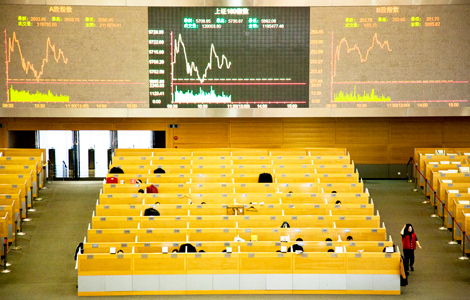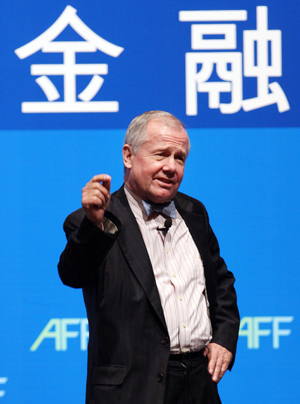
|
 The bowed heads of employees on the trading floor of the Shanghai Stock Exchange. Investor Jim Rogers has been keeping close watch at China's stock market and sees big opportunities. [Photo / Bloomberg] |
China has some big opportunities, says daring adventurer Jim Rogers
Successful international investor Jim Rogers is always on top of economic trends, so much so that the legendary Warren Buffett described him as unmatched.
Rogers is also a man of action. After many visits to China, he and his family settled in Singapore, getting his two young daughters to learn Chinese and preparing them for Chinese universities. He says, "China has huge investment opportunities."
Rogers showed interest in China's agriculture sector as early as the 1980s. In his biography he recalled riding his motorcycle from the Taklimakan desert in Xinjiang Uygur autonomous region to the eastern coast. On his way, he said, he was on intimate terms with Chinese buffalos, ducks, lands and people's lives in general.
In 1980, Rogers, then aged 38, decided to retire and spent time traveling on a motorcycle around the world. From 1990 to 1992, he traveled more than 160,000 kilometers across six continents, including China. The feat was picked up by the Guinness Book of World Records. Between Jan 1, 1999, and Jan 5, 2002, Rogers made another Guinness world record journey through 116 countries, covering 245,000 kms with his wife Paige Parker in a custom-made Mercedes.
|
 |
|
"There has been a bubble in the Chinese property market which is now over. The Chinese government has been trying to burst the bubble. I think the government is doing the right thing to bring down the price of property. If you do not pop bubbles, lots of people get badly hurt. The bigger the bubble gets, the worse it is for everyone." Jim Rogers, international investor |
"I do not have any land in China. I do not farm in China but I believe there are lots of opportunities in China's agriculture sector," Rogers told China Daily. "The (Chinese) government is doing everything it can to help agriculture. China knows it needs to produce more food."
China accounts for one fifth of the world's population with less than 9 percent of its arable land. The State Council suggested in a document released in February that China is aiming to get serious about technology to ensure long-term food supplies.
The council also said in the document that it would increase investment in, and subsidies for, the agricultural technology development this year to stabilize grain production.
China is going to spend 4 trillion yuan ($634 billion) in water conservation projects by 2020, according to a document released in 2011.
Since 2006, global private-equity investment firms, including KKR & Co, Carlyle Group and Blackstone Group, have invested in the Chinese agriculture sector. Blackstone-led investors put about $600 million in China Shouguang Agricultural Product Logistic Park, located in Shandong province. Domestic investment institutions, such as CDH Investments and Hony Capital, have also made investments in farming.
"Investment opportunities in travel are going to be huge. Over the past 30 years, many Chinese were not able to go abroad because of expensive fees and limits. Now the Chinese have become richer and it is easier to get passports to go abroad," said Rogers.
According to the World Tourism Organization, the number of Chinese tourists going abroad is estimated to become the fourth largest in the world by 2020 and the largest by 2035.
"There has been a bubble in the Chinese property market which is now over," said Rogers. "The Chinese government has been trying to burst the bubble. I think the government is doing the right thing to bring down the price of property. If you do not pop bubbles, lots of people get badly hurt. The bigger the bubble gets, the worse it is for everyone."
Since 2010, China has taken many measures to cool down the property market including imposing a tighter credit supply and higher down payments and limiting the number of homes that people can own.
"It's always right to follow what the government does, so look at the Five-Year Plan (2011-15) to see where the government's sympathy lies," said Rogers, adding that water infrastructure and biotechnology also offer many opportunities to make profits.
Foreign reserves
"I own dollars at the moment because they will go up for a while. If I was China, I would not buy many dollars because China already has $3 trillion. America is printing money every day," Rogers said.
"I will buy reserves of wheat, oil - things you might need someday - because they are useful," he added.
Rogers said that with its strong economy, China could make the yuan convertible now and everything would be cheaper - and people could leave dollars once there was an alternative.
"As an investor, I will not put money in European bonds because those countries are bankrupt. If China gives them (European countries) money, just gives them money to spend, the debt will get bigger and bigger. The crisis will return and you could lose all your money."
He added that China could gain influence by purchasing European bonds and win certain trade advantages. "But if I was Chinese, I would not want to let my government use my money to help people who failed," Rogers said.
He described his personality as skeptical, curious and persistent. He said when he finds something is wrong, he likes to "correct it and find out what is really true". He said he wants to explore himself and he believes many people fail because they give up.
In 1968, at the age of 26, Rogers, who was born in Baltimore, Maryland, and raised in Demopolis, Alabama, started his career in Wall Street as an assistant analyst, after studying at Yale and Oxford universities. He worked 15 to 16 hours every day, seven days a week.
Early in the winter of 1969, he felt that a bear market was coming to the United States. He discovered the fundamentals of the Cincinnati Milling Machine Co were in a terrible state so he spent all his money on purchasing put options on the company. When the US market fell sharply at the beginning of 1970, he sold all his options and tripled his money.
However, five months later, in September, he lost all his money short selling University Computing Co. He found out that the fundamentals of the company did not match the high share price of $48 but the market did not reflect this until two years later, when the price fell to $2.
However, he was not put off. He picked himself up, brushed himself down and started all over again. In 1973, Rogers co-founded the Quantum Fund with George Soros. During the following 10 years, the portfolio gained 4,200 percent while the S&P advanced about 47 percent.
He said his hobby now is his two daughters, Hilton Augusta, nicknamed Happy and born in 2003, and Beeland Anderson, nicknamed Baby Bee and born in 2008, because they are so much fun for him.
"I try to do what I can to teach them," he said. "Both my parents wanted me to do well in school. Although many people made great successes of themselves without the benefit of a good education, I will teach my children to do well in school."
caixiao@chinadaily.com.cn